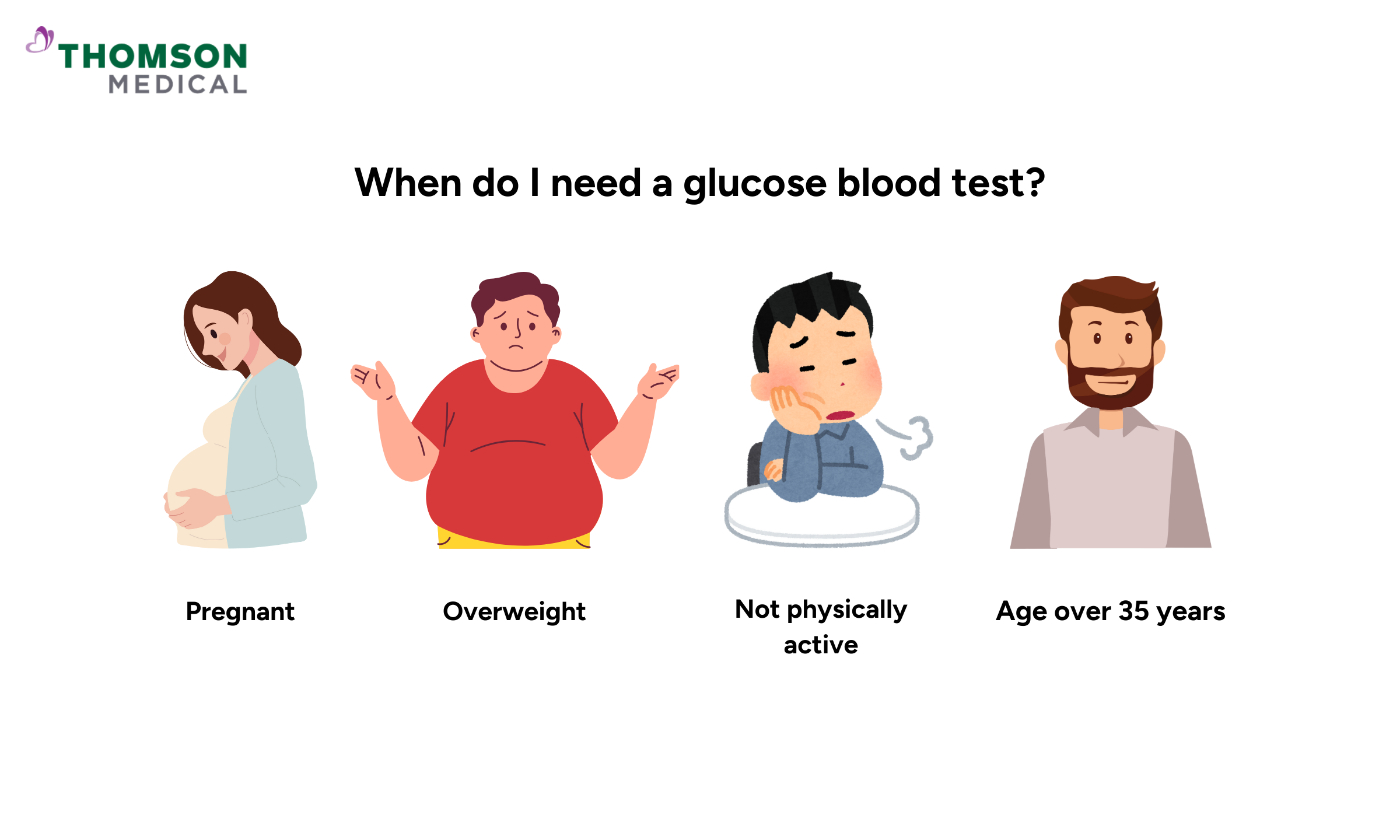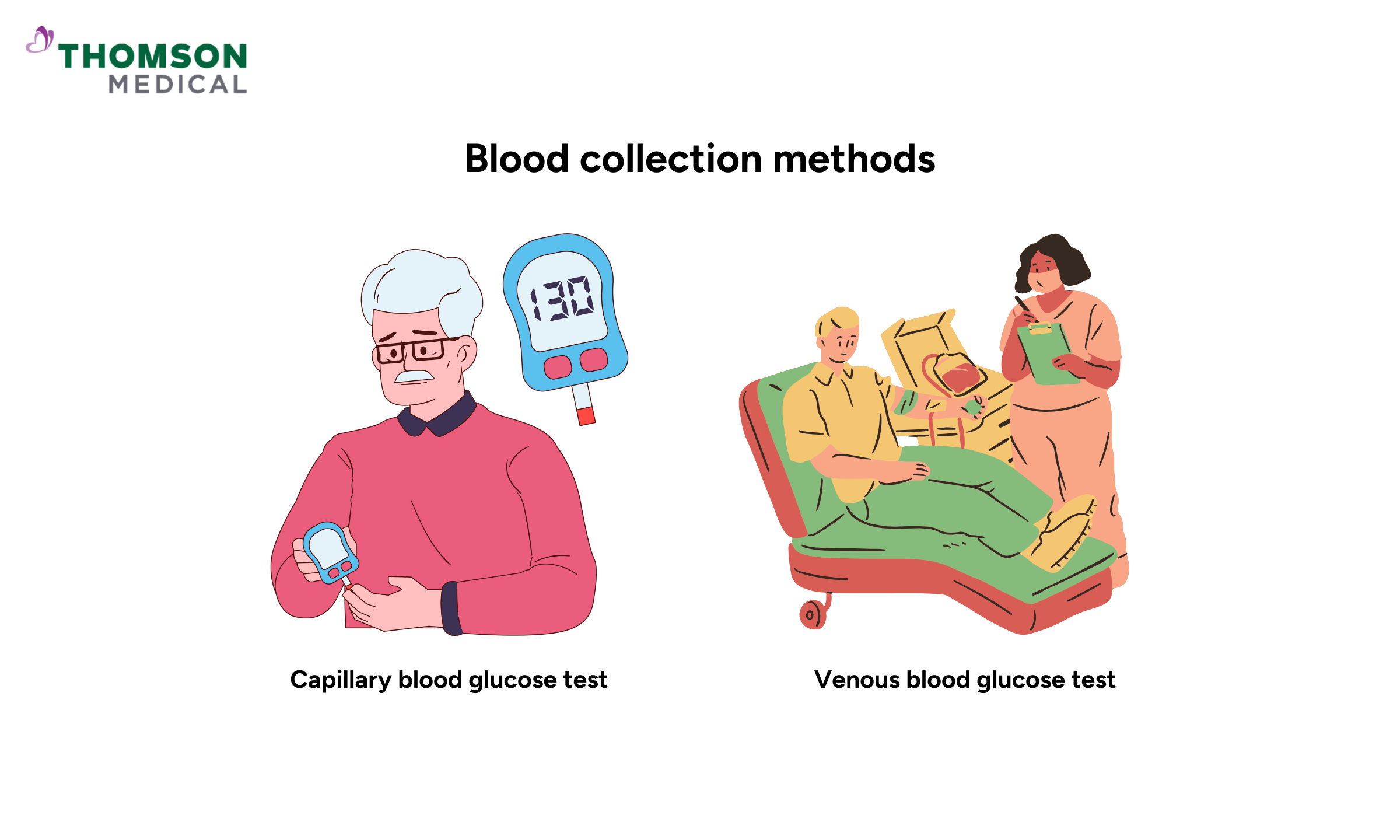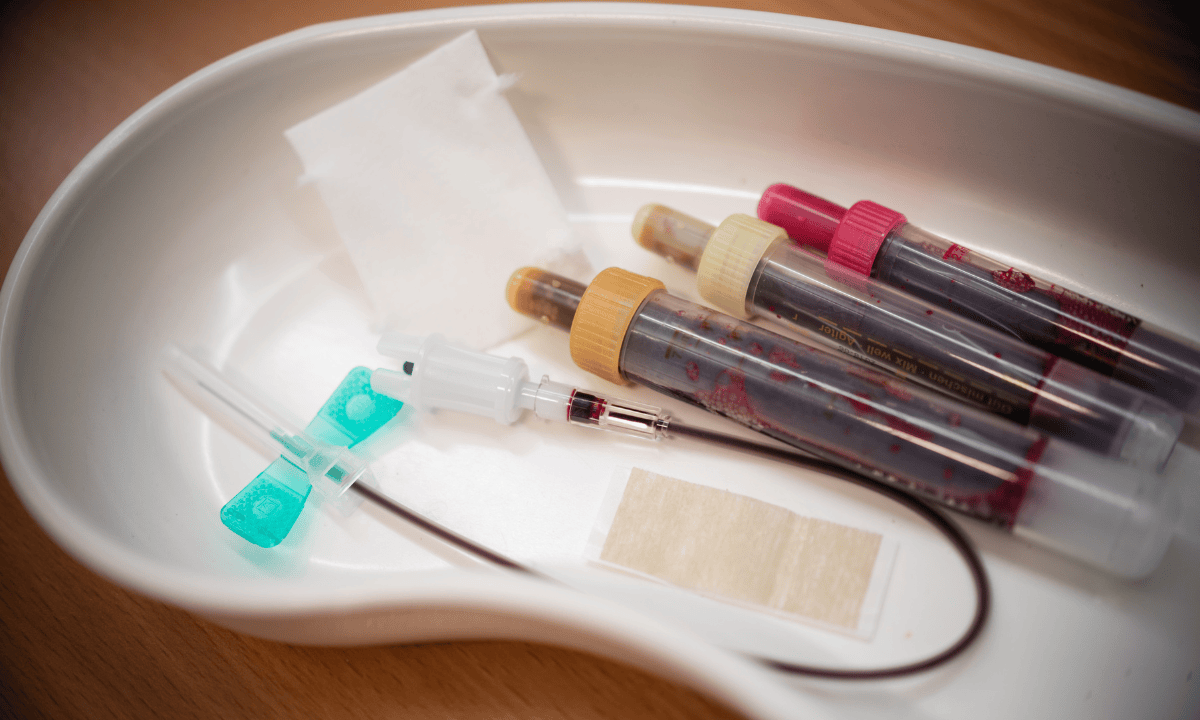What is a blood glucose test?
A glucose blood test measures the level of glucose (blood sugar) in your bloodstream. Glucose is the body's primary source of energy, which fuels cells, tissues, and organs. It comes from carbohydrates found in foods and drinks such as rice, potatoes, or fruit juices.
In healthy individuals, after consuming carbohydrates, the digestive system converts them into glucose so that the blood can absorb it. However, for the body to use this energy, the insulin hormone released by the pancreas is required to transport glucose to the cells.
Due to its function, insulin also plays a role in maintaining normal blood glucose levels. As such, if the results of a blood glucose test are too high or too low, it may indicate that the body does not produce enough insulin, is unable to use the hormone effectively, or there may be an underlying medical condition.

When do I need a blood glucose test?
A blood glucose test can be done as part of your routine blood tests that assess metabolic health. However, your healthcare provider may also perform this test to screen for pre-diabetes and diabetes or monitor existing diabetes. Your healthcare provider may also order a blood glucose test if you:
Have risk factors for diabetes, such as:
Being over 35 years old
High blood sugar level on a previous test
Not physically active
Diagnosed with prediabetes
Being overweight
Having a family history of diabetes
Having high blood pressure or heart disease
Pregnancy, which can lead to gestational diabetes
Are experiencing symptoms of high blood sugar levels, including:
Increased thirst
Frequent urination (peeing)
Blurred vision
Fatigue
Sores that are slow to heal
Losing weight without trying
Numbness or tingling in your feet or hands
Or are experiencing symptoms of low blood sugar levels, such as:
Feeling shaky or jittery
Hunger
Fatigue
Feeling dizzy, confused, or irritable
Headache
A fast heartbeat or arrhythmia (a problem with the rate or rhythm of your heartbeat)
Having trouble seeing or speaking clearly
Fainting or seizures
Other than the factors above, if you're currently taking medications like corticosteroids that can affect blood sugar levels, your provider may recommend regular blood glucose checks. This is due to the potential for these diabetic medications to significantly reduce insulin levels.
If you are experiencing any of these symptoms, request an appointment with Thomson Medical. Our specialists can assist with further diagnosis, including blood glucose testing, to determine the cause of your symptoms and provide an appropriate treatment plan.
Blood collection methods

A blood glucose test is a simple procedure that only requires a sample of your blood to measure the amount of glucose in it. There are two main methods for collecting a blood sample, which are:
Capillary blood glucose test
This is the simplest method of drawing blood, as it only requires a drop of blood from your fingertip that has been pricked with a needle. This blood is then dripped on a test strip and checked with a glucometer, which is a portable glucose meter.
A capillary method is quick, convenient, and can be done at home. However, it may not provide the best accuracy of your blood sugar compared to venous blood glucose testing.
Venous blood glucose test
This method is just like any other type of blood draw, where a healthcare provider collects a small amount of blood from a vein in your arm. A vial is used to collect the blood sample, which is then sent to a laboratory for analysis.
A venous blood draw is more accurate and reliable than capillary testing, making it the preferred method for diagnostic purposes or when precise measurements are required.
Type of glucose blood test
Before conducting the blood glucose test, your healthcare provider will determine the appropriate test based on your medical condition. The choice of test depends on the information needed to diagnose or monitor your blood sugar levels.
Here are the types of blood glucose tests that can be performed, which include:
Fasting blood sugar test
This test measures your blood glucose levels after you've fasted (not eaten or drunk anything except plain water) for 8 to 12 hours. Fasting is required because this test aims to measure blood sugar at its lowest point, and consuming food or sugary drinks can increase your blood sugar.
The fasting blood glucose tests show a more accurate picture of your baseline blood sugar since they eliminate the influence of glucose from recent meals.
Oral glucose tolerance test (OGTT)
The oral glucose tolerance test (OGTT) evaluates how effectively your body processes glucose to energy. For this test, you will need to fast for at least 8 hours. After the fasting period, a baseline blood sample is taken to measure your initial blood sugar level.
Next, you will drink a sugary solution containing 75 grams of glucose dissolved in water. Blood samples are then taken at regular intervals (usually every hour) over the next 2–3 hours to track how your body metabolises the glucose.
Random blood glucose test
As the name suggests, this test can be performed at any time, regardless of when you last ate. This test gives immediate results, so it can be used to screen for diabetes and monitor the effectiveness of your current treatment plan.
Glucose challenge test
This is a simplified version of the OGTT, primarily used during pregnancy to screen for gestational diabetes. Unlike the OGTT, fasting is not required for this test.
You will be asked to drink a sugary solution containing a specific amount of glucose, and a blood sample will be taken one hour later to measure your blood sugar levels.
What to expect during a blood glucose test
Depending on the type of glucose test recommended by your healthcare provider, you may need to fast for 8 to 12 hours before the test. However, if your test does not require fasting, you can eat and drink as usual before the procedure begins.
Blood samples can be taken via finger prick or directly from a vein. When using the finger prick method, a handheld glucometer analyses the blood on-site, providing immediate results. On the other hand, blood taken from your vein is sent to a laboratory for analysis, and the results usually arrive in a few days.
What do the results of a blood glucose test mean?
Based on the results of your blood glucose test, your healthcare provider can determine whether your blood glucose level is low, normal, prediabetes, or diabetes. The test results are also divided into 2 groups: fasting glucose and non-fasting glucose tests.
Low blood glucose level
In healthy adults, a blood glucose test result of 3 mmol/L (55 mg/dL) or lower indicates hypoglycaemia (low blood sugar). For those diagnosed with diabetes, a test result of 70 mg/dL or less is considered hypoglycaemia.
This condition is common in people with diabetes, caused by the excess use of insulin medications to lower the blood sugar. Taking less food or exercising more than usual after taking your diabetes medication can also cause this condition.
For individuals without diabetes, low blood glucose levels are rare. However, if they do occur, it's usually due to underlying health conditions like liver or kidney disease or alcohol use disorder. Prolonged periods without food can also lead to low blood sugar levels.
Normal blood glucose levels
Glucose levels are considered normal when a fasting glucose test measures between 4.0 and 5.4 mmol/L (72–99 mg/dL). Meanwhile, for random blood glucose tests that do not require fasting, the acceptable range varies based on your recent food intake, with a normal result of 7.8 mmol/L (140 mg/dL) or lower.
Prediabetes
A fasting blood glucose test between 5.6 and 6.9 mmol/L (100-125 mg/dL) usually indicates prediabetes. Similarly, a non-fasting blood glucose test with results between 7.8 and 11 mmol/L (140–199 mg/dL) also suggests prediabetes.
Prediabetes means that your blood sugar levels are higher than normal but not high enough to be classified as diabetes. However, without lifestyle changes, people with prediabetes have an increased risk of developing Type 2 diabetes within 5 to 10 years.
Diabetes
A fasting glucose level of 7.0 mmol/L (126 mg/dL) or higher, confirmed by multiple tests, is indicative of diabetes. Meanwhile, an intermittent blood glucose test showing a level of 200 mg/dL (11 mmol/L) or higher also signals diabetes.
If your healthcare provider suspects diabetes based on the results of your blood glucose test, they may order additional tests, such as a haemoglobin A1C (HbA1c) test, to make further diagnoses.
If you are experiencing symptoms of high or low blood sugar or have risk factors for diabetes, request an appointment with Thomson Medical. Our specialists can help by performing further diagnosis and providing recommendations tailored to your medical condition.

Glucose blood test Singapore
A glucose blood test is a diagnostic tool for measuring blood sugar levels and detecting conditions like prediabetes, diabetes, or hypoglycemia. In Singapore, this test is widely accessible and can be done at various healthcare facilities, such as polyclinics, private GP clinics, hospitals, or health screening centres.
Cost of glucose blood tests in Singapore
The cost of a glucose blood test varies depending on the type of test, the facility (public or private), and whether it is part of a health screening package.
Basic costs
Fasting and non-fasting blood glucose tests can range from $5 at subsidised rates to $10 or $15 at private clinics.
An oral glucose tolerance test (OGTT) can cost around $27 to $30 at private clinics.
HbA1c tests usually range from $25 to $40, depending on the clinic or lab.
Health screening packages
Basic health screening packages that include glucose blood tests may start from $100, while comprehensive packages can cost between $200 and $1,000, depending on the included test.
Subsidies for glucose blood tests in Singapore
Singapore offers several subsidy programs to make blood glucose tests more affordable, such as:
Screen for Life (SFL), where eligible Singaporeans aged 40 and above can receive subsidised health screenings, including glucose blood tests, for as little as $5.
Community Health Assist Scheme (CHAS) cardholders may be eligible for subsidies on glucose testing at participating GP clinics. Subsidies apply to both the test and the first post-screening consultation if required.
For detailed fee information and payment options, request an appointment at Thomson Medical.
What are the risks of a blood glucose test?
Since the blood glucose test simply requires a sample of your blood, it is a low-risk procedure. However, since some of the tests require you to fast for up to 12 hours, there may be some minor discomforts that you may experience, such as:
Slight bruising, swelling, or soreness at the punctured site.
Slight pain or discomfort around the punctured area.
A slight sting during the needle insertion or removal.
Dizziness and fatigue due to low glucose levels during the fasting period before the blood collection procedure.
FAQ
What is the blood glucose test for?
A blood glucose test is used to measure the level of glucose (blood sugar) in your blood, which can be performed for several purposes:
As part of routine blood tests to assess your metabolic health.
To screen for prediabetes and diabetes.
To monitor existing diabetes.
To check for low blood sugar (hypoglycaemia).
Experiencing symptoms of high or low blood sugar.
What is the glucose blood test normal range?
Normal blood glucose levels vary depending on whether the test was done after fasting or not:
For fasting blood glucose tests (after 8-12 hours of not eating):
Normal range: 4.0 to 5.4 mmol/L (72-99 mg/dL)
Prediabetes: 5.6 to 6.9 mmol/L (100-125 mg/dL)
Diabetes: 7.0 mmol/L (126 mg/dL) or higher
For random (non-fasting) blood glucose tests:
Normal: 7.8 mmol/L (140 mg/dL) or lower
Prediabetes: Between 7.8 and 11 mmol/L (140-199 mg/dL)
Diabetes: 11 mmol/L (200 mg/dL) or higher
What happens if my blood glucose level is high?
When blood glucose levels are too high, it causes hyperglycaemia, which can lead to various health problems, such as:
Increased thirst
Frequent urination
Fatigue
Unintentional weight loss
Blurred vision
Increased risk of recurrent infections, such as mouth ulcers or bladder infections, due to weakened immunity.
What to avoid during a glucose test?
You need to avoid eating and drinking (except for plain water) for 8-12 hours before a blood glucose test. This is because food and beverages, especially those containing sugar or carbohydrates, can affect your blood sugar levels and affect the test results.
Additionally, if you are taking diabetes medications, consult your healthcare provider beforehand, as you may need to adjust or temporarily stop taking them before the test. Always follow your doctor’s instructions to prepare properly for the procedure.
Can I drink water before a blood glucose test?
Yes, you can drink only plain water before a glucose test. You need to avoid drinks other than plain water, as they may affect the blood glucose result.
Yes, you can drink plain water before a blood glucose test, even if you're doing a fasting blood glucose test. However, you should avoid all other beverages, including:
Coffee or tea (even without sugar)
Fruit juices
Soft drinks
Energy drinks
Alcoholic beverages
These beverages contain calories, caffeine, or other substances that could affect your blood glucose levels and lead to inaccurate test results.
The information provided is intended for general guidance only and should not be considered medical advice. For personalised recommendations based on your medical conditions, request an appointment with Thomson Medical.
For more information, contact us:
Thomson Specialists Paragon (Health Screening)
- Mon - Fri: 8.30am - 5.30pm
- Sat: 8.30am - 12.30pm
Call: 6735 0300
Request a Health Screening